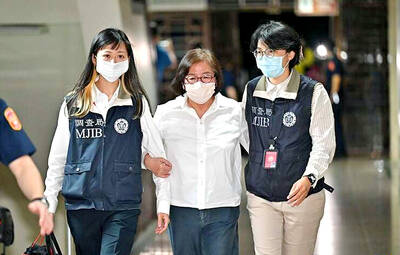As the Bureau of National Health Insurance (NHI) totters on the brink of insolvency, its future was the focus of discussion at its year-end news conference yesterday.
"The NHI system is on life support," said Deputy Minister of Health Chen Shih-chung (
Chen blames chronic underinvestment, not malfeasance, for the bureau's financial woes.
"The OECD spent 8.9 percent of its gross domestic product [GDP] on healthcare expenditures, whereas Taiwan only spent 6 percent, of which the NHI only accounted for 3.5 percent," Chen said.
Chen added that he would like to see Taiwan's healthcare expenditure raised to OECD levels by expanding spending on the NHI to 5 percent of GDP.
"We have a terrific NHI, rated second in the world by The Economist magazine," he said.
"It serves 99 percent of the population; it covers an extremely wide range of medical treatments; it has extremely low administrative costs ... but we have to be willing to pay enough to keep it going," Chen added.
He also expressed frustration with the Taipei City Government, which has raised objections to shouldering NHI expenses for out-of-town workers who work in the city.
"Taipei keeps all of Chinese Petroleum Company's local taxes because its headquarters is in Taipei even though most of the company's factories are located elsewhere," Chen said.
"So why shouldn't [Taipei] chip in for the workers' healthcare even if these workers live elsewhere?" Chen added.
The NHI has borrowed in excess of NT$70 billion from banks to cover the amount still owed to it by municipalities and individuals, Chen said.
"However, the NHI has not borrowed money simply because its expenditures exceed its income. We have been operating at a loss," he added. "We are set to run out of money after the first quarter of this year."
The "drug pricing black hole" was another hot topic of discussion at the conference.
"So far, a quarter of the hospitals have responded to our demand that they restate their drug-pricing records," bureau chief Chu Tzer-ming (
"We expect most companies to comply before the Feb. 15 deadline," Chu said
Hospitals that do not own up to exaggerating drug costs by the deadline will be punished heavily if they are later found guilty of wrongdoing, he added.

Costa Rica sent a group of intelligence officials to Taiwan for a short-term training program, the first time the Central American country has done so since the countries ended official diplomatic relations in 2007, a Costa Rican media outlet reported last week. Five officials from the Costa Rican Directorate of Intelligence and Security last month spent 23 days in Taipei undergoing a series of training sessions focused on national security, La Nacion reported on Friday, quoting unnamed sources. The Costa Rican government has not confirmed the report. The Chinese embassy in Costa Rica protested the news, saying in a statement issued the same

Taiwan is to extend its visa-waiver program for Philippine passport holders for another year, starting on Aug. 1, Minister of Foreign Affairs Lin Chia-lung (林佳龍) said on Friday. Lin made the announcement during a reception in Taipei marking the 127th anniversary of Philippine independence and the 50th anniversary of the establishment of the Manila Economic and Cultural Office (MECO) in Taiwan, the Ministry of Foreign Affairs said. The decision reflected Taiwan’s commitment to deepening exchanges with the Philippines, the statement cited Lin as saying, adding that it was a key partner under the New Southbound Policy launched in 2016. Lin also expressed hope

Temperatures in New Taipei City’s Sindian District (新店) climbed past 37°C yesterday, as the Central Weather Administration (CWA) issued heat alerts for 16 municipalities, warning the public of intense heat expected across Taiwan. The hottest location in Taiwan was in Sindian, where the mercury reached 37.5°C at about 2pm, according to CWA data. Taipei’s Shilin District (士林) recorded a temperature of 37.4°C at noon, Taitung County’s Jinfeng Township (金峰) at 12:50 pm logged a temperature of 37.4°C and Miaoli County’s Toufen Township (頭份) reached 36.7°C at 11:40am, the CWA said. The weather agency yesterday issued a yellow level information notice for Taipei, New

CASE: Prosecutors have requested heavy sentences, citing a lack of remorse and the defendants’ role in ‘undermining the country’s democratic foundations’ Five people affiliated with the Chinese Nationalist Party (KMT), including senior staff from the party’s Taipei branch, were indicted yesterday for allegedly forging thousands of signatures to recall two Democratic Progressive Party (DPP) lawmakers. Those indicted include KMT Taipei chapter director Huang Lu Chin-ru (黃呂錦茹), secretary-general Chu Wen-ching (初文卿) and secretary Yao Fu-wen (姚富文), the Taipei District Prosecutors’ Office said in a news release. Prosecutors said the three were responsible for fabricating 5,211 signature forms — 2,537 related to the recall of DPP Legislator Wu Pei-yi (吳沛憶) and 2,674 for DPP Legislator Rosalia Wu (吳思瑤) — with forged entries accounting for